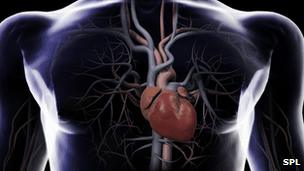Cardiac cells 'heal heart damage'
- Published

Many researchers are looking at using stem cells to repair the heart.
Stem cells taken from a patient's own heart have, for the first time, been used to repair damaged heart tissue, researchers claim.
The study, published in the Lancet, external, was designed to test the procedure's safety, but also reported improvements in the heart's ability to pump blood.
The authors said the findings were "very encouraging"
Other experts said techniques with bone marrow stem cells were more advanced and that bigger trials were needed.
The scientists say this is the first reported case of cardiac stem cells being used as a treatment in people after earlier studies had shown benefits in animals.
Improvement
The preliminary trial was on patients with heart failure who were having heart bypass surgery. During the operation, a piece of heart tissue, from the right atrial appendage, was taken.
While the patient was being sewn up, researchers isolated cardiac stem cells from the sample and cultured them until they had about two million stem cells for each patient. The cells were injected about 100 days later.
Doctors measured how efficiently the heart was pumping using the left ventricle ejection fraction - what percentage of blood was leaving one of the heart's main chamber with every beat.
In the 14 patients given the treatment, the percentage increased from 30.3% at the beginning of the trial, to 38.5% after four months.
There was no change in the ejection fraction in the seven patients who were not injected with stem cells.
Dr Roberto Bolli, one of the researchers from the University of Louisville, told the BBC: "We believe these finding are very significant.
"Our results indicate that cardiac stem cells can markedly improve the contractile function of the heart."
Heart v bone
The heart is not the only source of potentially useful stem cells. Trials have already taken place using stems cells from bone marrow.
Prof Anthony Mathur, from Barts and the London School of Medicine and Dentistry, and Prof John Martin, from University College London, are already conducting large randomised clinical trials.
They are investigating the effect of giving patients stem cells from their own bone marrow, in NHS hospitals, within six hours of a heart attack.
Prof Mathur said of the cardiac stem cell study: "Caveats very much apply. It's a phase one trial so while the early results are great and promising, they need to design a big study to see if the results translate."
He also cautioned that improvements in ejection fraction were not the same as increasing survival or quality of life.
Prof Martin said he was "concerned" that the seven patients in the control group showed no improvement in ejection fraction, which would normally be expected, and that they were not given a sham treatment to account for the placebo effect.
He said that was acceptable when just testing a procedure's safety, but not when looking at effectiveness, which relies on the difference between the treated and control groups.
Prof Peter Weissberg, medical director at the British Heart Foundation, argued that the improvement in heart function was similar to those in other studies.
"This is positive, but the crucial next steps are to see whether this improvement is confirmed in the final completed trial, and to understand whether the cells are actually replacing damaged heart cells or are secreting molecules that are helping to heal the heart," he added.
Dr Bolli argues that stem cells from the heart might be more useful as "their natural function is to replace the cells that continuously die in the heart due to wear and tear".
He hopes to start the next phase of clinical trials in 2012.
- Published8 July 2011
- Published8 June 2011
- Published18 October 2011